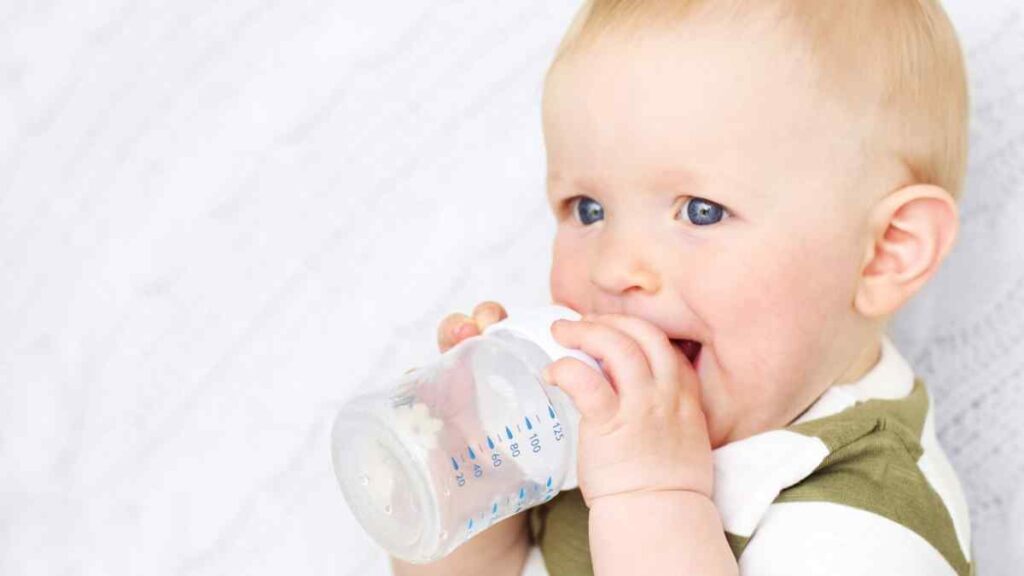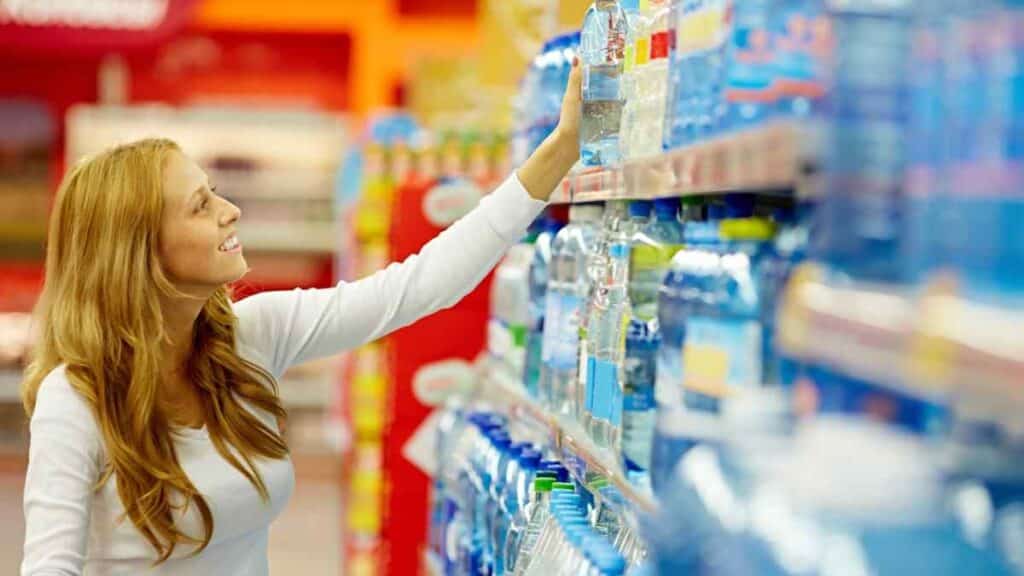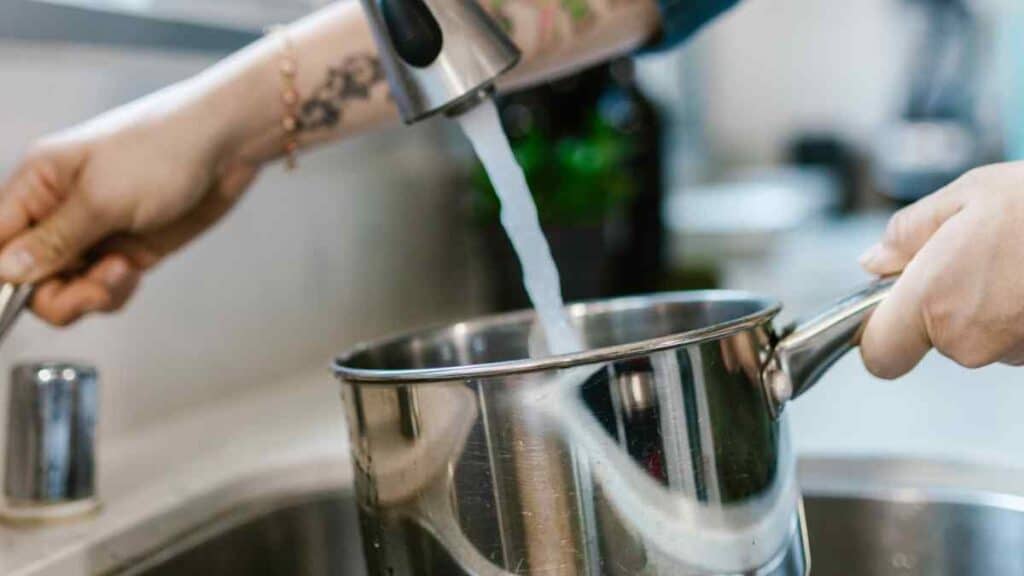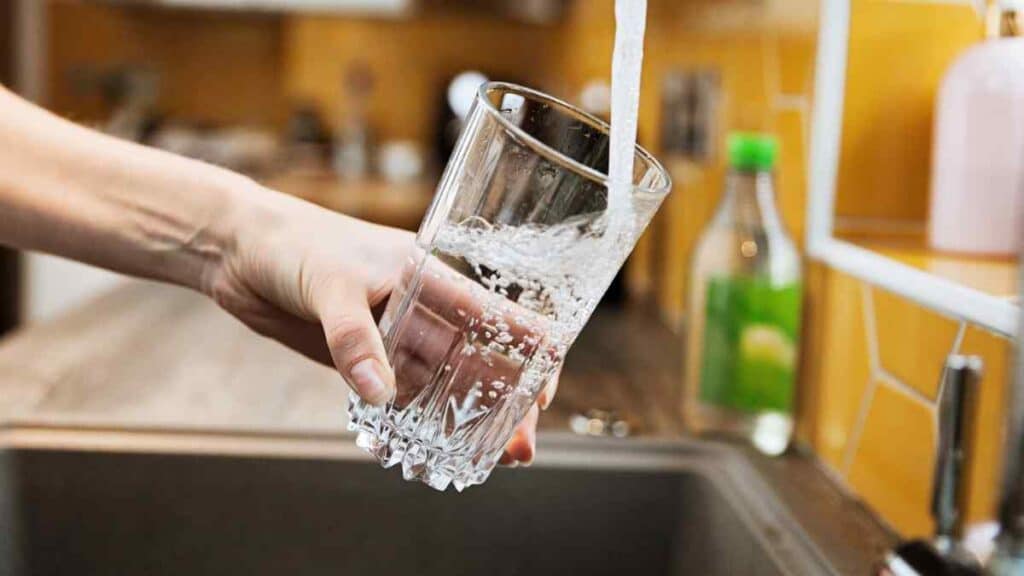As a parent, you want to do everything you can to ensure the health and well-being of your baby. One important aspect of infant care is choosing the right type of water for preparing mix infant formula. While it may seem convenient to use tap water, it’s essential to be aware of the potential risks and dangers when using it as nursery water.
This article will explore why using tap water for infant formula can be dangerous and harmful. We will also dig deep into the types of water you can use to safely prepare baby formula.

Importance of Safe Drinking Water To Babies
You’ve probably got a lot on your plate when it comes to keeping your baby happy and healthy. One thing you need to take note of is hydration. Babies need plenty of water, and they must get enough of it.
The amount of water you should give your baby depends on their weight and age. The Centers for Disease Control and Prevention recommends giving babies between the ages of 0-6 months about 2 ounces (60 mL) of water daily. Over 6 months old, they need at least 2 cups (500 mL) of water daily.
Babies’ bodies are still developing and growing, so they need the right amount of fluids to help them grow properly. Water is essential for keeping your baby healthy because it transports nutrients throughout the body and helps regulate body temperature. It also helps flush toxins out of your baby’s system through urine and sweat.
If you don’t give them enough water, their bodies won’t be able to process all the food they eat. This can lead to dehydration and malnutrition. In contrast, too much water can lead to water intoxication.
Considering Water Quality For Making Infant Formula
Ensuring the water quality in preparing infant formula is crucial to keep the baby hydrated. The water used to make baby formula must be safe and free from contaminants. The main concerns are bacteria, such as E. coli and salmonella, which can be present in tap water or well water. These bacteria can cause water-related diseases in babies and are especially dangerous to those born prematurely. Additionally, tap water may also contain contaminants and impurities.
Impurities and Contaminants Found in Tap Water
When making your baby’s formula, you want to be sure it’s as close to breast milk as possible. You also want it to be safe, and tap water can be a great source of clean drinking water for that purpose. But tap water can also contain impurities and contaminants that harm your baby’s health.
Contaminants can be in the form of chemicals and metals such as lead, chlorine, copper, iron, mercury, and arsenic, to name a few. On the other hand, impurities like minerals can also be found in tap water.
For example, tap water is often fortified with fluoride by the local water company. Fluoridated water helps prevent cavities and promotes overall dental health in the general public. However, too much fluoride in a baby’s diet can be dangerous. It may result in mild dental fluorosis, which causes faint white lines in teeth and other health problems. Tap water may also contain other minerals not necessary for babies, which may cause electrolyte imbalances.
Therefore, it is crucial to ensure reliable sources in formula preparation. Before you give your baby tap water, you should always check to see if your local health department gets the water tested and that it meets federal standards for safety.
Health Effects of Contaminants on Infants
Infants are in a very vulnerable stage of their lives. They are more susceptible to the effects of water impurities and contaminants than adults because they drink more water per pound of body weight than adults do.
There are several health effects that infants can experience from drinking contaminated water. The most common health effects include diarrhea and dehydration. Diarrhea causes severe dehydration in infants because their small stomachs hold less fluid. This means it is easier for them to become dehydrated after diarrhea. Another common health effect experienced by infants who drink contaminated water is cholera, which causes severe diarrhea and vomiting and can be severe if not treated immediately.
To ensure that your baby gets the best possible start to life, you should inspect the safety of the water supply you are using in making formula. Boiled filtered water and bottled water are great options for mixing powdered formula. These are both safer than just using plain tap water.
Bottled water is generally considered the safest option for babies under one-year-old, but check the expiry date on any bottles you buy before using them. If you want to use filtered tap water instead of buying bottled water, make sure you invest in a good quality filter first. Some filters are better than others at removing bacteria like E Coli and Salmonella from your supply. Lastly, the Centers for Disease Control and Prevention and World Health Organization advise boiling filtered tap water before using it to mix infant formula.

Why Purified Or Distilled Bottled Water Is Best For Baby Formula
Purified or distilled water for formula preparation is vital for several reasons. These types of water have been treated to remove impurities and contaminants, making them safer for infant nutrition.
In contrast, tap water can be contaminated with various types of bacteria and chemicals that can be harmful if ingested. This is true for babies, especially premature infants who are more vulnerable due to their underdeveloped immune systems.
The Benefits Of Using Purified Or Distilled Water For Baby Formula
Using purified or distilled water to prepare infant formula has several benefits. These types of water have been treated to remove impurities and contaminants, making them safer for infant nutrition.
One of the main benefits of using purified or distilled water for ready-to-feed formula is the reduced risk of contamination. Purified water has been treated using various methods to remove impurities and contaminants, such as reverse osmosis, UV light, or carbon filtration. On the other hand, distilled water has been boiled, and the steam is collected to remove impurities. As a result, purified and distilled water are generally considered safer and purer than tap water.
Another benefit is improved taste. Impurities and contaminants in tap water can sometimes affect the taste of powder formula, making it less appealing to babies. Using purified or distilled water can help to ensure that the baby formula has a clean, fresh taste that babies are more likely to accept.

Ensuring Tap Water Is A Safe Water Source For Preparing Infant Formula
One of the most important things you can do to prepare your baby’s formula is to ensure their drinking water is clean and safe. If you’re unsure whether or not to use it to make infant formula, boiling tap water is a great option. Here are some steps you can take to properly boil tap water:
- Run the tap for several minutes until the water runs clear.
- If there is any discoloration in the water after running it through a filter, it is likely due to the filter being clogged up with debris from previous use.
- If you notice an odor or taste in your tap water, then boiling tap water first will help remove any bacteria or other contaminants.
- Boil water for one minute. Let the freshly boiled water cool for 30 minutes a room temperature, and then use it for preparing baby formula.

Safe and Healthy Infant Nutrition: Tips for Preparing and Storing Baby Formula
Proper preparation and storage of baby’s formula are vital to ensure the safety and nutrition of your child. Following best practices and guidelines can help reduce the risk of contamination and other health hazards. You’ll be able to ensure that your baby gets the nutrients they need to grow and develop properly.
To safely prepare baby formula, there are a few things to remember.
- Always wash your hands thoroughly. The last thing you want to do is contaminate your baby’s food with bacteria or viruses from your hands!
- Make sure you have all the necessary equipment, such as a formula container, measuring spoon, and clean bottle. Also, ensure that any water used for washing bottles has been distilled or boiled first.
- Check the temperature of the prepared formula before giving it to your baby. You can check the temperature by pouring a few drops into the back of your hands. If it feels too hot for you, it’s not ready for your baby yet! If you use boiled tap water, never use hot water to make baby formula. Allow the hot water to cool first at room temperature or through an ice bath before use. If you use purified or distilled water, warm them at the right temperature.
- Before serving, stir well and shake the bottle gently. If you’re using powder, ensure all lumps have been dissolved before serving. If you’re using a concentrated liquid formula, shake the bottle gently before each use.
It is also essential to follow the baby’s formula packaging instructions when preparing a mix formula. This includes using the correct water ratio to powdered formula and measuring the amounts carefully. Using the right amounts of water and powder formula helps ensure that your baby gets the proper balance of nutrients.

The Risks of Tap Water: A Summary of Key Points
Using tap water in baby formula can be dangerous due to contamination with harmful bacteria and chemicals. Tap water can be contaminated with various types of bacteria and chemicals that can be harmful if ingested, especially for infants who are more vulnerable due to their underdeveloped immune systems. These contaminants can include lead, chlorine, and fluoride and can cause water-related diseases and developmental delays.
To reduce the risk of contamination and ensure the safety and nutrition of your baby, it is essential to use purified or distilled water for baby formula. Purified water has been treated using various methods to remove impurities and contaminants. In contrast, distilled water has been boiled, and the steam is collected to remove impurities. Both types of water are generally considered safer and purer than tap water, making them better choices for infant nutrition.
As a parent, it is your responsibility to take the necessary precautions to ensure the safety and health of your baby. In addition to using purified water for baby formula, it is also essential to follow proper preparation and storage guidelines. This includes following the instructions on the powder formula packaging, preparing the baby’s formula just before feeding, and discarding any leftover prepared formula after each feeding.
Did this article help you? We’d love to hear from you! Have a question? Let us know in the comments.



